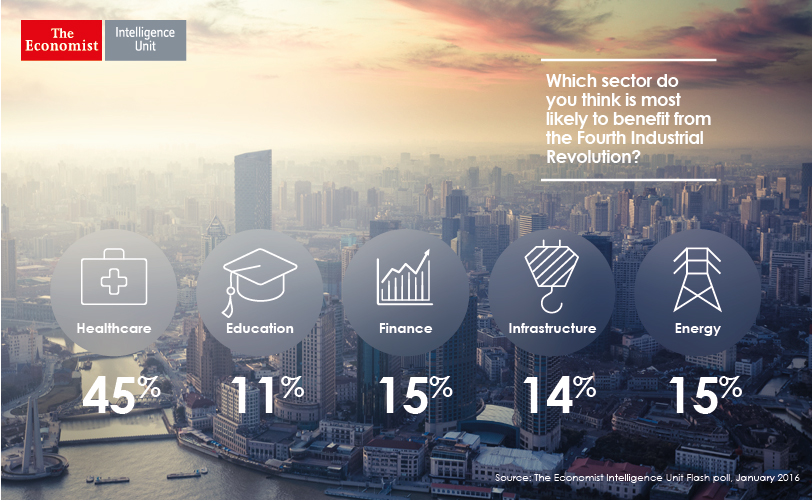The healthcare sector is the most likely to benefit from what the World Economic Forum calls the “Fourth Industrial Revolution”, according to executives polled by The Economist Intelligence Unit this week.
Described as an emerging industrial revolution triggered by “a fusion of technologies that is blurring the lines between the physical, digital and biological spheres”, the Fourth Industrial Revolution is the main focus of debate at this week’s WEF Annual Meeting in Davos, Switzerland.
To gauge executive opinion on this anticipated megatrend, The Economist Intelligence Unit this week polled 622 business leaders, from around the world and a range of industries. The poll revealed that a significant majority of executives believe that healthcare is the sector that will benefit most from its impact (see chart).

The potential for merging physical, digital and biological systems certainly has far-reaching potential for healthcare provision. Already, consumer technologies such as smartphones and wearable fitness devices are collecting highly detailed data about health and fitness. This information has the potential to transform not only individual care - an EIU study found last year that 50% of doctors believe mobile technology will allow patients to participate more proactively in their own care in the next five years - but also medical research.
Meanwhile, many healthcare providers are exploring the potential of telemedicine, monitoring and treating patients remotely via Internet-connected sensors and medical devices. It is hoped that telemedicine will prove especially valuable in the treatment of chronic conditions that affect the elderly, allowing senior citizens to receive medical check-ups in the comfort of their own homes, and bring medical care to communities in remote locations.
Looking forward to the future, some of the more fantastical medical applications emerging from this combination of physical, digital and biological technologies include pills that incorporate digital sensors to regulate drug release; robotic limbs that respond to a patient’s thoughts; and virtual reality psychotherapists.
Taken together, all of this technology is expected by many to have as great an impact on healthcare as the emergence of statistical research in the late 19th century.
Of course, such a profound revolution will force healthcare providers to substantially adapt their working practices. Unfortunately, the EIU poll also reveals that fewer than one in four healthcare executives (38%) believe they are either ‘fairly’ or ‘very’ well prepared for the Fourth Industrial Revolution.
Perhaps unsurprisingly, telecommunications and IT executives are most likely to say they are well prepared (75% and 70% respectively), while retailers were least likely (19%).
These poll results imply that the incumbent healthcare providers need to step up their efforts to incorporate integrated physical, digital and biological systems into their practices. As has been shown repeatedly elsewhere, if they don’t, there is an army of digital startups ready to take their place.
The views and opinions expressed in this article are those of the authors and do not necessarily reflect the views of The Economist Intelligence Unit Limited (EIU) or any other member of The Economist Group. The Economist Group (including the EIU) cannot accept any responsibility or liability for reliance by any person on this article or any of the information, opinions or conclusions set out in the article.
Further reading:




